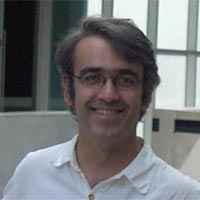Workshop on
Quantum Measurements and Operations for Criptography and Information Processing
Nonlocality and Classical Correlations
>VITAE:
Guido Bacciagaluppi is researcher at the Institut d'Histoire et de Philosophie
des Sciences et des Techniques (CNRS, Paris1, ENS), Paris. He was born
in Milan in 1965. After obtaining his degree in mathematics from ETH Zurich
and his doctorate in philosophy from the University of Cambridge, he was
Research Fellow at Wolfson College, Cambridge, and at Balliol College,
Oxford. He was Junior Lecturer at Oxford University, Assistant Professor
at the University of California at Berkeley, as well as Humboldt Fellow
at the University and the IGPP of Freiburg (Germany). His work is mainly
on the philosophy of physics, in particular the foundations of quantum
mechanics. His interests range from the more technical subfields (pilot-wave
theory) to the more speculative ones (Everett’s many-words). He
has contributed significantly to the development and critique of modal
interpretations of quantum mechanics. More recent interests include the
direction of time and probability, as well as their relation to quantum
mechanics. He is currently working (with A. Valentini) on a commentary
and English translation of the Proceedings of the Fifth Solvay Congress
(1927), a rather more historical project. Guido Bacciagaluppi is further
subject editor in quantum mechanics for the Stanford Encyclopedia of Philosophy.

In the same framework of diffusion processes on configuration space as used by Nelson, but restricted to local theories, we show how imposing initial (or final) constraints on particle distributions can mimick nonlocal behaviour at the level of the probability distribution and probability current. The required constraints are distributions involving classical correlations. Specifically, we show that a non-linear Schroedinger equation for non-interacting (but generally entangled) particles can be derived from such a local theory with constraints. This casts further doubts on the generality of arguments claiming that non-linearity implies non-locality.